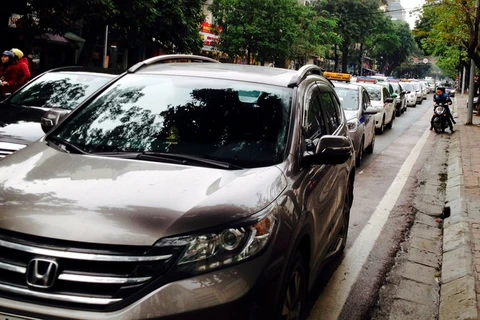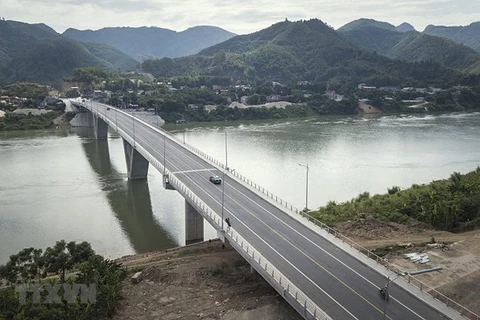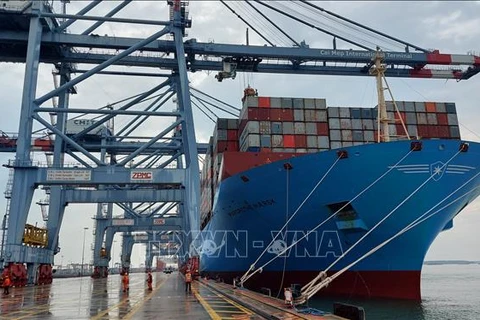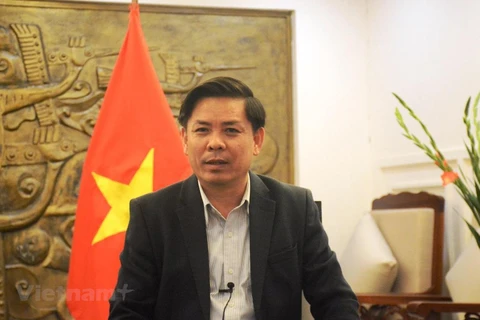Hanoi (VNA) – The Transport Ministry’s relevant agencies need to coordinate with provinces and cities across the country to ensure an uninterrupted national ‘green lane’, especially for food and foodstuff transportation, Minister Nguyen Van The has said.
‘Green lane’ vehicles receive a QR code, enabling them to be prioritised and pass through COVID-19 checkpoints without lengthy waits. The aim is to facilitate the smooth circulation of necessities throughout the nation amid the current upsurge in COVID-19 cases
‘Green lane’ added for waterways
According to Nguyen Van Huyen, Director of the Directorate for Roads of Vietnam said the agency is coordinating with technological units to operate the QR code registration software.
The software is expected to be launched at 63 provincial/municipal Departments of Transport from July 19, the official said.
It was reported that a number of localities have yet to play an active role in implementing the ‘green lane’ strategy and they have, therefore, found it difficult to keep a regular and reliable circulation of goods in the period of social distancing.
Four checkpoints, in the southern provinces of Long An and Tien Giang, where the directorate has suggested the ‘green lane’ be piloted have yet to set up medical facilities.
To increase the flow of essential goods between Ho Chi Minh City and other southern localities, the municipal Department of Transport has considered implementing the ‘green lane’ on waterways and commandeering suspended express tourist boats for the transportation of goods.
The HCM City Department of Transport is working with the Vietnam Inland Waterways Administration and the Vietnam Register on the solution, which has received the support of the Transport Minister.
Minister The has assigned the Vietnam Inland Waterways Administration and the Vietnam Register to coordinate on developing the plan.
Reducing checkpoints on ‘green lane’
To ensure the smooth circulation of goods and prevent a scarcity of necessities, the minister has asked provinces and cities to actively deploy the ‘green lane’.
Southern localities hit hard by the COVID-19 pandemic, such as Dong Nai, Binh Duong, Ba Ria-Vung Tau and Binh Phuoc, should quickly coordinate with their adjacent localities where no infections have been found, like Dak Nong, Lam Dong and Binh Thuan, to set up checkpoints to closely control the movement of vehicles and people.
The minister also urged the Directorate for Roads of Vietnam to review all checkpoints on the ‘green lane’ in order to safely reduce them, saying checkpoints should be maintained on roads inside provinces and cities.
Relevant agencies should give the green light to vehicles with QR codes and conduct check-ups randomly, he said, noting that businesses and drivers with no COVID-19 testing certificates or having invalid certificates will be handled strictly.
He ordered the establishment of a steering committee led by a deputy transport minister, which will instruct the transportation of goods during the pandemic.
The Transport Department of Ho Chi Minh City, as of the afternoon of July 11, has granted QR identification codes to over 12,000 vehicles. These vehicles are allowed to transport essential goods through COVID-19 quarantine checkpoints in the city – now Vietnam’s largest pandemic outbreak hotspot.
Accordingly, between July 8 and 11, the department issued QR codes to a total of 12,207 vehicles from 22 units to facilitate the transportation of essential goods.
Trucks from neighbouring provinces must be identified by QR codes so that they can pass through anti-pandemic checkpoints quickly.
With all three of its largest wholesale markets and half of the traditional markets, supermarkets and food stores closed, the city is publicising information about 2,833 food supply points with locations, contact phone numbers and delivery methods for people to access them easily.
The city’s Department of Industry and Trade said the list of such places will be sent to each district, ward and commune, adding that the number of places is high and they are widely distributed, so the public can be assured of an uninterrupted supply./.
























